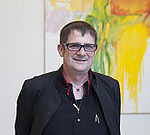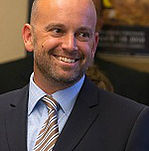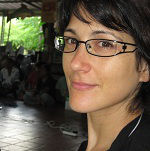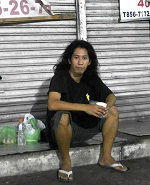Homelessness in a Global Landscape
2015 | Chicago, USA
Conference Recap and Next Steps
IGH convened its first bi-annual research conference in Chicago from June 1 – 2, 2015. The conference brought together 100 thought leaders from 30 countries to explore broad themes in global homelessness.
We will draw on what we learned to narrow the focus for the next conference, tentatively planned for Summer 2017. Location and dates will be announced in 2016.
To access resources, video and powerpoints from the 2015 conference, navigate to “post-conference resources” on the menu above or below.
“How can we create a home for this intellectual work so that the larger world can benefit from what’s being learned on the ground, so that we can share what’s been working, and so that we can bring data to bear to think about how public policy is shared and expanded across a world in great need?”

Kerry Anthony
Lunchtime plenary: Reflections from the ground
Kerry has been the Chief Executive of Depaul Ireland since 2007, and previously was the Director of Services with the charity for 18 months. Under her leadership the organisation has tripled in size, and been awarded Investors in People Gold.
Kerry has been working in the field of homelessness for 18 years in London, Glasgow, Dublin and Belfast, in a range of statutory and voluntary sector roles. She holds a Masters in Social Work from Glasgow University and a Master in Voluntary Sector Management from Cass Business School, City University London. At 35, Kerry was made an MBE in the 2010 Queen’s New Year Honours list.
Whilst developing the work of Depaul in Ireland, Kerry is also part of the Senior Management Group for Depaul International and has supported development within the group, particularly supporting the work in Ukraine. Kerry also is a member of the International Commission for Systemic Change for the Vincentian family. She is a Board member of CO3 in Northern Ireland; on the Board of Governors of All Hallows College in Dublin and Túath Housing in Dublin.

Tim Aubry
Shared Solutions: Housing
First–Lessons from Canada and France
Tim Aubry, Ph.D, C.Psych., is a Full Professor in the School of Psychology and Senior Researcher at the Centre for Research on Educational and Community Services at the University of Ottawa. He is currently holder of the Faculty of Social Sciences Research Chair in Community Mental Health and Homelessness.
Over the course of his career, he has collaborated on research projects with community organizations and government, contributing to the development of effective social programs and policies. He served as a Member of the National Research Team and was the Co-Lead of the Moncton site in the multi-site At Home / Chez Soi Demonstration Project of the Mental Health Commission of Canada. Tim received the Award for Contribution to Evaluation in Canada in 2013 and the Order of Ottawa in 2014 for his contributions to research and training in the areas of homelessness and mental health. He is also a Fellow of the Society for Community Research and Action and the Canadian Psychological Association.
Lars Benjaminsen
Shared Solutions: Global adaptation of Critical Time
Intervention
Lars Benjaminsen is a researcher at The Danish National Center for Social Research where he coordinates a research programme on social exclusion. He is a member of the European Observatory on Homelessness, which is a European research group under FEANTSA (European Federation of National Organisations working with the Homeless).
He has conducted five national homelessness counts in Denmark and has evaluated the Danish National Homelessness Strategy. He has experience on evidence based interventions for homeless people and their implementation in a national and local policy context. He has participated in a European research project on Housing First where he conducted the Danish case study.

Volker Busch-Geertsema
Common Understanding sessions (various)
Dr. Volker Busch-Geertsema is a senior research fellow at the Association for Innovative Social Research and Social Planning (GISS, Bremen, Germany). He is a member of the European Observatory on Homelessness since 1995 and since 2009 he is the Coordinator of the Observatory and a member of the editorial team of the European Journal of Homelessness. He has conducted a large number of extensive research projects on different aspects of homelessness and housing exclusion (including definition and measurement) in Germany and Europe.
Between 2011 and 2013 he has coordinated the “Housing First Europe” project funded by the European Commission. For IGH he has worked with Suzanne Fitzpatrick and Dennis Culhane on a proposed global typology of homelessness and reflections on measurement of homelessness on a global scale as a member of our Steering Committee. To see his full bio, click here.

Louise Casey
Keynote Speaker
Louise Casey is Head of the UK Government’s Troubled Families programme based in the Department of Communities & Local Government. Appointed by the Prime Minister, David Cameron, she leads a programme to turn around the lives of 120,000 of the country’s most troubled families. She took up post in November 2011.
Louise was appointed in 1999 as the UK Homelessness Czar and led the successful strategy to reduce the number of people sleeping rough on the streets by 2002. Between 1992 and 1999, Louise was Deputy Director of Homelessness Charity Shelter and, prior to that, held a number of posts in the social welfare sector. To see her full bio, click here.
Dennis Culhane
Common Understanding:
Measurement Workshop
Common Understanding: Japan, Malaysia, China, Korea
Dennis Culhane is the Dana and Andrew Stone Professor of Social Policy at the School of Social Policy and Practice at The University of Pennsylvania, a Senior Research Associate at the Center for Population Studies, and the Director of Research for the National Center on Homelessness among Veterans at the United States Department of Veterans Affairs.
Culhane is a nationally recognized social science researcher with primary expertise in the field of homelessness. He is a leader in the integration of administrative data for research and directs the Actionable Intelligence for Social Policy initiative, a MacArthur-funded project to promote the development of integrated database systems by state and local governments for policy analysis and systems reform. To see his full bio, click here.

Suzanne Fitzpatrick
Common Understanding:
Kazakhstan, India, the EU
Suzanne Fitzpatrick completed her PhD on youth homelessness at the University of Glasgow in 1998. She subsequently held a number of posts in the Department of Urban Studies at the University of Glasgow, including ESRC Research Fellow in Housing and Social Exclusion and, latterly, Lecturer in Housing and Social Policy.
From 2003 to 2010 Suzanne was Joseph Rowntree Professor of Housing Policy and Director of the Centre for Housing Policy at the University of York. Suzanne took up her Research Professorship in Housing and Social Policy at Heriot-Watt University in July 2010. Suzanne specializes in research on homelessness and housing exclusion, and much of her work has an international comparative dimension. Suzanne was until recently Editor of the International Journal of Housing Policy. To see her full bio, click here.
Stephen Gaetz
Common Understanding: Thailand, Philippines, Russia & Canada
Shared Solutions: Addressing homelessness among children and youth
Stephen Gaetz is a Professor in the Faculty of Education at York University in Toronto. As Director of the Canadian Observatory on Homeless and the Homeless Hub, Stephen Gaetz is committed to increasing the impact of research on homelessness policy, planning and practice, thereby contributing to solutions to end homelessness in Canada.
His research on homelessness has focused on youth, economic strategies, nutritional vulnerability, education and legal and justice issues, as well as solutions to homelessness from both a Canadian and international perspective. Recently he has co-edited volumes on youth homelessness in Canada and on Housing First. In 2014, Dr. Gaetz also became President of Raising the Roof, Canada’s leading charity focusing on solutions to homelessness. To see his full bio, click here.

Petra Gimbad
Lunchtime plenary: Reflections from the ground
Petra Gimbad is a lecturer in topics of gender studies and migration studies at Monash University Malaysia. Prior to this, she worked for various organizations involved with refugee families, sexual health, street youth and women’s rights.
Her doctorate on the economic activities of homeless persons, a continuance of her interest in homeless communities, will commence this fall. She is a regular contributor to a shared column for an English language newspaper in Malaysia, where she writes on various issues, including, homelessness.
Paula Goering
Shared Solutions: Housing
First–Lessons from Canada and France
Dr. Paula Goering RN PhD, a Professor at the University of Toronto and an affiliate scientist at the Centre for Addiction and Mental Health, has a long career of mental health services research and knowledge translation activities. She has consistently been committed to work that includes rigorous methods and is focused upon practical solutions. Her ongoing, related interest in knowledge translation has involved working creatively with diverse constituencies and audiences, including government policy makers.
She was the research lead for At Home/Chez Soi, a $110 million research demonstration project on mental health homelessness. This five city pragmatic, multi-method intervention trial was conducted by the Mental Health Commission of Canada. This project generated a wealth of empirical and experiential knowledge about Housing First that is the basis for policy and practice change.
Daniel Herman
Shared Solutions: Global adaptation of Critical Time
Intervention
Daniel Herman is Professor and Associate Dean for Scholarship and Research at the Silberman School of Social Work at Hunter College where he directs the Center for the Advancement of Critical Time Intervention (CTI), a time-limited psychosocial intervention designed to improve continuity of support and prevent recurrent homelessness among people with severe mental illness and other vulnerable groups.
Working with a variety of collaborators, he is involved with developing and testing adaptations of CTI for various populations and service transitions. He has trained and consulted with numerous public and private organizations in the US and abroad on implementation of the CTI model. Dr. Herman began his research career after a dozen years working as a social worker in New York City’s public mental health and homeless services systems.

Paul Howard
Moderator: Building a Movement
Mr. Howard is the Senior Director of Knowledge Sharing (KnoSh) at Community Solutions. In this role, Paul leads the organization’s domestic and international consulting work. KnoSh uses its Agile Problem Solving methodology (APS) to improve systems and solve complex issues, particularly in the areas of homelessness, neighborhood revitalization and healthcare. His work has included managing the launch of the Institute of Global Homelessness (IGH), the development of a comprehensive online platform known as Homelink that matches homeless people to vacancies in permanent housing (a la a Match.com or Airbnb for homeless people), the planning and launching of a 20,000 Homes Campaign in Canada, leading Community Solution’s efforts as a partner in the 100 Million Healthier Lives Campaign and extensive neighborhood revitalization efforts in New York City and New York State.
Prior to heading up KnoSh, Paul served as the Director of Data and Performance Management for Community Solution’s successful 100,000 Homes Campaign. Paul brings 20 years of experience working in human services in a variety of capacities including direct services, program design, system design, performance management, housing development and consulting. Paul Holds a BA in Political Science and Spanish from Knox College and a Masters in Public Administration from City University of New York, Baruch School of Public Affairs.

Guy Johnson
Common Understanding: Aregentina, Brazil, and Australia
Guy is the Deputy Director at the Centre of Applied Social Research at RMIT University (Melbourne, Australia) and is currently in the US for 12 months as a Visiting Scholar at the University of Pennsylvania. He has been involved in the area of homelessness for almost three decades, initially as a practitioner and more recently as a researcher. Since completing his PhD in 2006 Guy has published extensively on homelessness and is a co-author of On the Outside: Pathways in and out of homelessness and Young People leaving state out-of-home care: Australian policy and practice, and recently co-edited Homelessness in Australia: An Introduction. Guy is currently working on three longitudinal projects examining transitions in and out of homelessness. He is a member of the Homelessness Statistics Reference Group which was established by the Australian Bureau of Statistics to advise on methodology and to review definitions.

Isabel LaCalle
Common Understanding: Measurement Workshop
Isabel LaCalle Pons is a social worker and Executive Director of Corporación Nuestra Casa, a non-profit organization located in Santiago, Chile since 2010. She has been working for 15 years to overcome the social exclusion that the homeless suffer. As a leader of the Red Calle movement, she brings together the NGO’s working with homeless to have a common voice and influence public policies at the state level. She is part of the founding team at CalleLink. Last year, she led the training for the Winter Program throughout the country.
A dedicated advocate, she seeks to help overcome poverty and improve the lives of those in the most vulnerable positions. She believes in the capabilities of the people and that it is possible to build a fairer, more inclusive society. Her work seeks to provide equal opportunities and help establish and unprejudiced society that believes in and empowers its citizens.
Yeunsook Lee
Common Understanding: Japan, Malaysia, China, Korea
Yeunsook Lee graduated from the Housing & Interior Design Department of Yonsei University, received master’s degree from the same graduate school, and Ph.D. from Oklahoma State University in USA for housing environment and interior design. She is a professor of Interior Architecture & Built Environment. Professor Lee has played the role of Design Advocate and Meta designer to propagate new standards and principles for “Good Design” by actively developing theories and researching on the creation of future-oriented spaces and carrying out projects to actualize them into real designs, as well as organizing exhibitions to introduce new thought systems and their practical possibilities to professional and general public alike. She has been president of many academies such as AIDIA, KIID, KIEAE, KGS.
Professor Lee authored more than 40 books about the theoretical aspects of creating future residential spaces including “Culture-specific Housing for the Aged”, “Quality of Life and Environmental Design”, and “Interior Design Guidelines for Elderly Housing”. As industry-university cooperation projects, she developed and designed major “Future Houses” in Korea, and planned and developed the Future Housing Pavilion “Human Space”, “Future House”, “Health House”, “Culture House” of Daewoo Engineering & Construction’s, and the futuristic house “Sustainable House” of POSCO Engineering & Construction’s.
She has especially considered the education of next generation very important to make them real robust professionals and citizens who will be leading the future world. Her experience including education, research, practice and other diverse activities has supported her enthusiasm toward experimental education for future generation.

Jake Maguire
Moderator: Building a movement
Jake Maguire is Director of Communications and Thought Leadership at Community Solutions. From 2010-2014, he led communications for the 100,000 Homes Campaign, the organization’s flagship housing initiative, which helped 186 U.S. communities find permanent housing for more than 105,000 chronically homeless Americans in under four years. He spearheaded Community Solutions’ successful bid for the United Nations World Habitat Award in 2013‚ as well as its high profile feature on 60 Minutes a year later.
Prior to joining Community Solutions, Jake developed and executed successful communications strategies for a diverse range of corporate, political and non-profit clients. He is a graduate of Amherst College and holds a master’s degree from the University of Texas at Austin.

Steven Metraux
Common Understanding: Measurement Workshop
Stephen Metraux, PhD, is Associate Professor of Health Policy and Public Health at the University of the Sciences, and a researcher at the VA’s National Center for Homelessness Among Veterans..
His research focuses primarily on homelessness and housing, veterans issues, mental illness and community integration, prison reentry, and other aspects of urban health.

Geoffrey Nelson
Shared Solutions: Housing
First–lessons from Canada and France
Geoffrey Nelson is Professor of Psychology and a faculty member in the graduate program in Community Psychology at Wilfrid Laurier University, Waterloo, Ontario. His research and practice has focused on housing and community mental health programs for people with serious mental illness and community-based prevention programs for children and families.
In 2013 he received the award for Distinguished Contributions to Theory and Research in Community Psychology from the Society for Community Research and Action (SCRA), Division 27 (Community Psychology) of the American Psychological Association, and he received the McNeill Award for Innovation in Community Mental Health from SCRA and the American Psychological Foundation in 1999.

Eoin O’Sullivan
Shared Solutions: National strategies to address homelessness
Dr. Eoin O’Sullivan is a Fellow of Trinity College, Professor in Social Policy and Head of the School of Social Work and Social Policy, Trinity College, Dublin. He is a member of the European Observatory on Homelessness and lead editor of the European Journal of Homelessness.
He is a member of the National Homelessness Consultative Committee, and chairs the statutory National Traveller Accommodation Consultative Committee. Collaborative books include Coercive Confinement in Ireland: Patients, Prisoners and Penitents (2012) and Homelessness and Homeless Policies in Europe: Lessons From Research (2010).
Gideon Ochien Onyango
Shared Solutions: Addressing homelessness among children and youth
Gideon Ochieng Onyango worked directly with Street Children and families in Kenya and Seattle Washington for a total of 10 years. He is involved in formation of one of the first programs to address the issue of street girls in Nairobi through outreach, selection, rehabilitation and relocation of teenage street girls.
Currently, he is the Executive Director at the Center for Transforming Mission Kenya and is working with other stakeholders in the city’s poor areas to address issues of affordable housing, improved household income and access to college education for youth. He also continues to mentor the former street children who are now fully re-integrated into the society.

Kwaku Oppong Asante
Shared Solutions: Addressing homelessness among children and youth
Kwaku Oppong Asante is an emerging Ghanaian researcher and lecturer who hold a Masters degree in Human Development from the Norwegian University of Science and Technology, Trondheim, Norway, and a PhD in Psychology from the University of KwaZulu-Natal, Durban, South Africa.
His research interests focus on adolescent health and well-being (particularly homeless children and youth), social and psychological aspects of HIV/AIDS and health promotion. He has published in reputable journals such as BMC Public Health, Journal of Affective Disorders, Journal of Adolescence, African Journal of Psychiatry, and the International Journal of Psychology. He also acts as a reviewer on a number of journals and loves watching football and reading as his hobbies.

Griselda Palleres
Common Understanding: Argentina, Brazil, Australia
Griselda Palleres is an anthropologist and PhD in Social Science from the University of Buenos Aires, Argentina. She has fifteen years of experience in field work with homeless people and governmental and non-profit organizations. Her research has focused on the rights of homeless people and collective actions.
In the last few years, with the collaboration of a social organization of homeless people, she has worked in the treatment of the first law on homelessness in the city of Buenos Aires. She has published several articles and two books on the subject.

Ashwin Parulkar
Shared Solutions: National strategies to address homelessness
Common Understanding: Kazakhstan, India, EU
Ashwin Parulkar is the project head of the Knowledge Centre on Urban Homelessness at the Centre for Equity Studies in New Delhi. The Knowledge Centre is funded by Oxfam India and is engaged in homeless policy advocacy and research into vulnerabilities homeless people face to death on the streets, physical health burdens and barriers to health care, psychosocial burdens associated with social isolation and substance abuse, unsafe and insecure livelihoods, violence on the streets, and challenges faced by the state and social workers in assuring access to homeless shelters.
Ashwin’s previous research at CES concerned work on hunger and the right to food. He is the co-editor of a forthcoming book on debates that emerged on the right to food in India between the 2001 public interest litigation case in the Supreme Court, which resulted in the recognition of the right to food as inherent to the Constitutional right to life, and the passage of national food security legislation in 2013. He is co-author of a forthcoming book that chronicles government responses to starvation deaths in rural India. He has researched and consulted for international organizations such as UNICEF, International Food Policy Institute, the Chicago Council on Global Affairs, and Freedom House. Ashwin holds an MA in international relations and an MFA in creative writing from Syracuse University as well as a BS in Management from Case Western Reserve University.

Juan Martín Péres García
Shared Solutions: Addressing homelessness among children and youth
Defensor de derechos humanos, especialmente, derechos de la infancia y poblaciones callejeras. Psicólogo por la Escuela Nacional de Estudios Profesionales Zaragoza de la Universidad Nacional Autónoma de México (UNAM), Formador y conferencista internacional. Sus aportes le han permitido recibir premios y reconocimientos de la UNAM, Secretaria de Salud, CONASIDA y la Reina Sofía de España, entre otros. Integrante de la Junta de Gobierno y Asamblea Consultiva del CONAPRED, COPRED-DF, del Consejo Consultivo de UNICEF México. Desde 1998 es miembro de la red internacional Ashoka.
Fue fundador en 1994 de El Caracol A.C. ONG especializada en la promoción y defensa de derechos humanos de las poblaciones callejeras. Desde 2010 es Director Ejecutivo de la Red por los Derechos de la Infancia en México.
Nicholas Pleace
Shared Solutions: National strategies to address homelessness
Nicholas Pleace is a Senior Research Fellow at the Centre for Housing Policy, University of York, UK and he also works for the European Observatory on Homelessness, which operates under the auspices of FEANTSA, the European Federation of Homelessness Organisations. Nicholas has been active in UK policy and academic research on homelessness since the mid-1990s and has directed over 40 research projects focused on homelessness, working mainly with UK central government departments, individual national governments within the UK, and major homelessness charities and homelessness service providers. Nicholas has directed homelessness research for the Finnish Ministry of the Environment and the French Inter-ministerial body with responsibility for the national homelessness strategy (DIHAL).
He led three homelessness research projects in Ireland and has worked on homelessness research for the European Commission and OECD. Nicholas is a member of the Editorial Committee for the European Journal of Homelessness and co-authors the annual comparative studies of homelessness in Europe produced by the European Observatory on Homelessness. He is an associate member of the Women’s Homelessness in Europe Network (WHEN) and an Associate Fellow at the Centre for Research in Comparative and Global Social Policy (CRCG) and the International Centre for Mental Health Social Research (ICMHSR) at York.
Christina Psarra
Shared Solutions: Housing
First–lessons from Canada and France
Since 2014, Christina has held the position of the general coordinator in the unit MARSS, a multidisciplinary team with a recovery oriented approach created in 2007 with the aim to improve medical and social care for mentally ill homeless people, the most “hard to reach” population in the EU context. MARSS initiated the “Housing First” program in France and pioneered the inclusion of peer health mediators. The same year, she joined the research team of “Housing First” in Marseille. Prior to that, she was the Head of Missions for Médecins du Monde in Greece. During the most intense period of the Greek crisis, she designed several aid projects and published two reports on discrimination and racist violence.
She has obtained a bachelor in Philosophy, a Master’s degree in NGOs and Development from the London School of Economics and Political Sciences and has attended the Harvard Executive Education program on Strategic Management for Leaders of NGOs. She speaks English, French and Greek.

Mao-Sheng Ran
Common Understanding: Japan, Malaysia, China, Korea
Dr. Mao-Sheng Ran is an associate professor at Department of Social Work and Social Administration, and an honorary professor at Department of Psychiatry, The University of Hong Kong. He has medical degrees (BMed., MMed) from West China University of Medical Sciences and a PhD in Social Work from the University of Hong Kong. He was a clinical psychiatrist at Department of Psychiatry, West China Hospital, Sichuan University from 1985 to 1999, and a full professor at Division of Health Sciences, University of Guam (USA) from 2011 to 2013.
His research interests include social/transcultural psychiatry, community mental health, epidemiology, family intervention, mental health social work, suicide and disaster event. He has been principal investigator of numerous research projects, receiving grant awards from World Health Organization (WHO), National Institute of Health (NIH), American Foundation for Suicide Prevention (AFSP) and etc. He once did a few studies on homeless persons with mental disorders in rural China. He has published over 100 academic papers in peer-reviewed journals, both in English and Chinese.

Tim Richter
Co-Emcee
Tim Richter is the President & CEO of the Canadian Alliance to End Homelessness (CAEH). The mission of the CAEH is to create a national movement to prevent and end homelessness in Canada. Prior to joining the CAEH, Tim was President & CEO of the Calgary Homeless Foundation charged with leading the implementation of Calgary’s 10 Year Plan to End Homelessness – the first plan of its kind in Canada.
In the first four years of Calgary’s 10 Year Plan more than 4,000 homeless men, women and children were housed, 3,582 units of affordable housing were funded, and homelessness went down for the first time in 20 years of counting.
Nan Roman
Interactive Planning Session: Building a global research agenda
Nan Roman is President and CEO of the National Alliance to End Homelessness, a public education, advocacy, and capacity-building organization. She is a leading national voice on the issue of homelessness. Under her guidance, the Alliance has successfully identified and promoted innovative strategies for ending homelessness that have been adopted by communities across the country.
In her role, Ms. Roman works closely with members of Congress and the Administration, as well as with officials and advocates at the state and local levels. She collaborates with Alliance partners to educate the public about the real nature of homelessness and effective solutions. She has researched and written on the issue of homelessness, regularly speaks at events around the country, and frequently serves as an expert on the issue for the media.To see her full bio, click here.

Rayna Rusenko
Common Understanding: Japan, Malaysia, China, Korea
Rayna M Rusenko has over a decade of advocacy and research experience pertaining to social welfare, labor, housing, and homelessness policy through her work as an activist with homeless communities in Tokyo, Japan and Kuala Lumpur, Malaysia. She holds a master’s degree in public policy from the University of Malaya and is currently a PhD student in global and socio-cultural studies at Florida International University, specializing in sociology.
Her research centers on the inter-relationship between socioeconomic inequality, prejudice, and public policy—as well as the historical role these have played in shaping and propagating homelessness globally. She is also interested in social justice movements and civic channels for shaping policy at all levels of government.

Silvia Schor
Common Understanding: Argentina, Brazil and Australia
Silvia Maria Schor, is an Assistant Professor in the Economics Department, Faculty of Economics and Business, University of São Paulo, SP, Brazil. She is a senior researcher in the Institute of Economic Research Foundation (Fundação Instituto de Pesquisas Econômicas), University of São Paulo and Coordinator of the Census of Homeless People, 2015, 2009, 2003, 2000, for the Municipality of the City of São Paulo.
She is a Coordinator of research project on social housing, for Housing Secretary of the State of São Paulo and has a Ph.D. in Economic Theory.

Jeremy Swain
Co-Emcee
Jeremy Swain began working with homeless people in 1980, starting as a volunteer. After working in a variety of paid roles including as a street outreach worker he progressed to be Chief Executive of Thames Reach. Thames Reach provides a range of services to over 7,000 people every year including street outreach, specialist accommodation for people with substance misuse and mental health issues, tenancy support projects, day services and employment programmes.
Jeremy is deputy chair of the London Housing Foundation which funds a range of different homelessness-related initiatives and a member of the London Mayor’s Rough Sleeping Group, tasked with reducing rough sleeping in the capital. He is also a board member of Homeless Link, the national body for homelessness organisations working directly with homeless people in England. To see his full bio, click here.
Aslan Tanekenov
Common Understanding:
Kazakhstan, India, the European Union
Aslan Tanekenov is Associate Professor at the Kazakh-British Technical University in Almaty, Kazakhstan. He obtained his PhD degree in the UK in 2013. For more than 10 years, Aslan Tanekenov worked as a Consultant in various projects of the United States Agency for International Development (USAID), USA, and the Department for International Development (DFID), UK, which funded homelessness and disabled people NGOs in Kazakhstan. Aslan also was a researcher at a governmental think tank institution. He made overseas exchange of experience visits to Bangladesh, Hungary and Russia.
Aslan Tanekenov obtained his Master’s degree from the University of Glasgow, UK, and completed post-graduate cross-sector partnership training at the University of Cambridge, UK. He was awarded the British Foreign and Commonwealth Office Chevening Award in 2001 and the Kazakh Government’s ‘Bolashak’ Award in 2009.
Jember Teferra
Lunchtime plenary: Reflections from the ground
Jember Teferra is the Founder, Fundraiser, and Lecturer of the Institute for Urban Workers (IUW) as well as the Founder, Principal, and Fundraiser for the Birhan Social Development Training and Consultation Center (BSDTCC). She has her Master of Philosophy from the University of Manchester, and wrote her thesis on Community Workers as Facilitators of the PRimary Health Care Process in the Urban Addis Ababa. She is also a Doctor of Ministry in the Renewal of the Church for Mission.
She has published four books, including Beacon on the Slums (1994). She presented several seminar papers at A Year of Shelter for the Homeless on integration, health, and housing, and prepared documentation of experiences of the Integrated Holistic Approach Urban Development Project (1998).
Currently, Dr. Jeferra is seeking to register IUW as an NGO in its own right as the Birhan Social Development Training and Consultation Center and to set up three projects in urban slums in Addis Ababa.

Aurelie Tinland
Shared Solutions: Housing First – lessons from Canada and France
Aurélie Tinland is a psychiatrist with an extensive experience in public health. She is a member of the unit MARSS since its foundations and has participated in the evolution and the design of the “Housing First” program in France.
She is currently the chief quantitative researcher of the HF program and she supervises the daily data collection. She has participated and published several scientific articles on recovery and mental health.
She is an expert in the evaluation of public mental health projects, and more specifically projects related to the needs of people facing extreme exclusion and methodological research protocols. Her research interests focus on mental health outcome measures, methodological challenges and adaptation of evidence – based practices in mental health and peer – run research.
Graham Tipple
Plenary
Dr Graham Tipple is a chartered town planner and independent consultant. He has over 40 years’ experience in research and teaching on housing and urban development in Africa and Asia, including writing many major documents for UN-Habitat.
Dr Tipple is joint author, with Suzanne Speak, of “The missing millions: homelessness in developing countries”, London, Routledge (2009). He is currently writing the Housing chapter in the forthcoming World Cities Report 2015, and is part of the group developing the Global Housing Strategy to begin in 2016.
Paul Toro
Common Understanding: Measurement workshop
Paul A. Toro is Professor of Psychology at Wayne State University in Detroit. He and his Research Group on Homelessness and Poverty have conducted a wide range of studies on homelessness over the past 30 years, including studies on homeless adults, families, and youth.
His studies have compared homeless to matched housed samples, evaluated interventions, provided careful assessment of mental disorders and substance abuse, collected data across nations, assessed public opinion, analyzed media and professional coverage, and followed large homeless samples in longitudinal designs.

Elena Tsatsura
Common Understanding: Thailand, the Philippines, Russia, and Canada
Elena Tsatsura has been studying various aspects of homelessness in Russia since 2004. She is the author and coauthor of 16 publications dedicated to homelessness problem, including several books. Her main research interests are analysis of barriers homeless people face in different spheres, state social assistance system, NGOs helping the homeless, interdepartmental and intersectional relations.
Elena is one of the founders of the Moscow Network of organizations helping homeless people “If there is no home…” She is one of the coordinators of the Annual Multi-Regional Conference on Homelessness in Russia (first was held in 2010) and Annual ArtFestival of Solidarity (conducted in 2012 for the first time).

Sam Tsemberis
Shared Solutions: Housing First – lessons from Canada and France
Dr. Sam Tsemberis serves as CEO of Pathways to Housing, an organization he founded in 1992 based on the belief that housing is a basic human right. Pathways developed the consumer driven evidence-based Housing First program that provides immediate access to permanent supportive housing to individuals who are homeless and who have mental health and addiction problems.
In addition to serving as a lead trainer within Pathways’ Housing First Institute, Dr. Tsemberis is also on the faculty of the Department of Psychiatry at Columbia University Medical Center. He is currently participating in national studies of homelessness, mental illness, and addiction, and has published numerous articles and book chapters on these topics, including the Housing First manual (Hazelden Press, 2010). Dr. Tsemberis is continuously engaging with communities and agencies considering Pathways’ model nationally and around the world.

Boonlert Visetpricha
Common Understanding: Thailand, the Philippines, Russia and Canada
Before becoming a lecturer, Boonlert Visetpricha has engaged with several successful social movements for more than ten years. He was the first one in Thailand who started organizing a street homeless people organization in Bangkok since 2002. His book, World of Homeless People (in Thai), received award for distinguished academic books in 2007.
Presently, Boonlert is PhD candidate at the University of Wisconsin-Madison, Anthropology Department. He just spent 14 months doing his fieldwork with homeless people in Manila, the Philippines.

Judith Wolf
Common Understanding: Thailand, the Philippines, Russia and Canada
Shared Solutions: Global adaptation of Critical Time Intervention
Judith Wolf is Professor of Social Care and head of Impuls, the Netherlands Center for Social Care Research, at Radboud University Nijmegen Medical Center. She is also director of the Academic Collaborative Center for Shelter and Recovery and the Academic Collaborative Center for Public Mental Health.
She has more than 30 years of experience in conducting both academic and applied research on socially vulnerable people (including homeless people and abused women) as well as on the social and health care services needed by these groups.
On June 1 and 2, IGH will convene thought leaders from six continents toward realizing one vision: a world where everyone has a home. Sessions will be organized along three program streams.
- Toward a common understanding of homelessness: These sessions will examine how homelessness is understood and measured across regions, gathering feedback toward a Global Typology of Homelessness and a strategy for measuring it worldwide.
- Interactive planning sessions: These participatory, facilitated working groups will bring attendees together to explore development of a global research agenda on homelessness and approaches to building a global movement.
- Shared solutions: These panels will explore what research, practice and policy tell us about successful approaches that work across countries. We will examine solutions to specific challenges, with emphasis on how these might be adapted to other local contexts.
For those unable to attend, follow the session discussions at #IGHConf!
A note on translation: All plenaries and half of the simultaneous workshops will be translated to or from Spanish. We have headphones available for those who would like to use this service. Sessions with translation are marked with a *.

Jeremy Swain
CEO | Thames Reach (Co-Chair)
Jeremy Swain began working with homeless people in 1980, starting as a volunteer. After working in a variety of paid roles including as a street outreach worker he progressed to be Chief Executive of Thames Reach.
Thames Reach provides a range of services to over 7,000 people every year including street outreach, specialist accommodation for people with substance misuse and mental health issues, tenancy support projects, day services andemployment programmes. The organisation employs around 300 staff and 150 volunteers. 68 members of the salaried work-force are former homeless people. In 2014, Thames Reach achieved a top 100 ranking on the Sunday Times best not-for-profit organisations to work for list.
Jeremy is deputy chair of the London Housing Foundation which funds a range of different homelessness-related initiatives and a member of the London Mayor’s Rough Sleeping Group, tasked with reducing rough sleeping in the capital. He is also a board member of Homeless Link, the national body for homelessness organisations working directly with homeless people in England.
He is an influential magazine columnist where he covers a range of issues related to homelessness, social exclusion and the work of the not-for-profit sector and has been twice short-listed for the Professional Publishers’ Association Business Columnist of the Year Award.
Nan Roman
President | National Alliance to End Homelessness (Co-Chair)
Nan Roman is President and CEO of the National Alliance to End Homelessness, a public education, advocacy, and capacity-building organization. She is a leading national voice on the issue of homelessness. Under her guidance, the Alliance has successfully identified and promoted innovative strategies for ending homelessness that have been adopted by communities across the country. In her role, Ms. Roman works closely with members of Congress and the Administration, as well as with officials and advocates at the state and local levels. She collaborates with Alliance partners to educate the public about the real nature of homelessness and effective solutions. She has researched and written on the issue of homelessness, regularly speaks at events around the country, and frequently serves as an expert on the issue for the media.
Her unique perspective on homelessness and its solutions comes from more than 20 years of local and national experience in the areas of poverty and community-based organizations.
Dennis P. Culhane
Professor of Social Policy | University of Pennsylvania
Dennis Culhane is the Dana and Andrew Stone Professor of Social Policy at the School of Social Policy and Practice at The University of Pennsylvania, a Senior Research Associate at the Center for Population Studies, and the Director of Research for the National Center on Homelessness among Veterans at the United States Department of Veterans Affairs. Culhane is a nationally recognized social science researcher with primary expertise in the field of homelessness. He is a leader in the
integration of administrative data for research and directs the Actionable Intelligence for Social Policy initiative, a MacArthur-funded project to promote the development of integrated database systems by state and local governments for policy analysis and systems reform.
His homelessness work has positioned him as an early innovator in the use of administrative data for research and policy analysis, particularly for populations and program impacts which are difficult to assess and track. Culhane’s work has resulted in federal legislation requiring all cities and states to develop administrative data systems for tracking homeless services in order to receive HUD funding. His work has also been instrumental in a national shift in how cities address chronic homelessness and family homelessness. Culhane’s recent research includes studies of the ageing homeless population and vulnerable youth and young adults, including those transitioning from foster care, juvenile justice, and residential treatment services.

Suzanne Fitzpatrick
Professor | Heriot-Watt University
Suzanne Fitzpatrick completed her PhD on youth homelessness at the University of Glasgow in 1998. She subsequently held a number of posts in the Department of Urban Studies at the University of Glasgow, including ESRC Research Fellow in Housing and Social Exclusion and, latterly, Lecturer in Housing and Social Policy.
From 2003 to 2010 Suzanne was Joseph Rowntree Professor of Housing Policy and Director of the Centre for Housing Policy at the University of York. Suzanne took up her Research Professorship in Housing and Social Policy at Heriot-Watt University in July 2010. Suzanne specializes in research on homelessness and housing exclusion, and much of her work has an international comparative dimension. Suzanne was until recently Editor of the International Journal of Housing Policy.
Stephen Gaetz
Professor | York University
Stephen Gaetz is a Professor in the Faculty of Education at York University in Toronto. As Director of the Canadian Observatory on Homeless and the Homeless Hub, Stephen Gaetz is committed to increasing the impact of research on homelessness policy, planning and practice, thereby contributing to solutions to end homelessness in Canada.
His research on homelessness has focused on youth, economic strategies, nutritional vulnerability, education and legal and justice issues, as well as solutions to homelessness from both a Canadian and international perspective. Recently he has co-edited volumes on youth homelessness in Canada and on Housing First. In 2014, Dr. Gaetz also became President of Raising the Roof, Canada’s leading charity focusing on solutions to homelessness.

Volker Busch-Geertsema
GISS | Bremen (European Observatory on Homelessness)
Dr. Volker Busch-Geertsema is a senior research fellow at the Association for Innovative Social Research and Social Planning (GISS, Bremen, Germany). He is a member of the European Observatory on Homelessness since 1995 and since 2009 he is the Coordinator of the Observatory and a member of the editorial team of the European Journal of Homelessness. He has conducted a large number of extensive research projects on different aspects of homelessness and housing exclusion (including definition and measurement) in Germany and Europe.
Between 2011 and 2013 he has coordinated the “Housing First Europe” project funded by the European Commission. In 2014 he published together with colleagues the results of a large research project on prevention of homelessness in Germany`s most populated regional state North Rhine-Westphalia and a statistical update of the extent and profile of homelessness in European member states. He has been involved in a number of evaluations of re-housing projects for homeless people and provides advice and support for a regional governmental action program to prevent and reduce homelessness. He is also member of the core research team of a project funded by the European Commission until December 2015 about homelessness prevention in the context of evictions in all 28 EU member states.
For IGH he has worked with Suzanne Fitzpatrick and Dennis Culhane on a proposed global typology of homelessness and reflections on measurement of homelessness on a global scale.

Tim Richter
CEO | Canadian Alliance to End Homelessness
Tim Richter is the President & CEO of the Canadian Alliance to End Homelessness (CAEH). The mission of the CAEH is to create a national movement to prevent and end homelessness in Canada. Prior to joining the CAEH, Tim was President & CEO of the Calgary Homeless Foundation charged with leading the implementation of Calgary’s 10 Year Plan to End Homelessness – the first plan of its kind in Canada.
In the first four years of Calgary’s 10 Year Plan more than 4,000 homeless men, women and children were housed, 3,582 units of affordable housing were funded, and homelessness went down for the first time in 20 years of counting.
measurement & definition plenary
Lead researchers Dennis Culhane, Suzanne Fitzpatrick and Volker Busch-Geertsema presented the IGH Global Typology of Homelessness. Discussion included overall categories, proposed focus areas for IGH and strategies to measure homelessness.
measurement workshop
This session set the context for measurement of homelessness on a global scale. The speakers examined and assessed existing methods for measuring homelessness, including capture/recapture, retrospective models, and telephone surveys.
housing first – lessons from canada and france
This session considered evaluations of Housing First in Canada and France, with attention to strategies for scaling up. The research team for Canada’s Chez Soi/At Home project discussed the results of their 5-year, multi-site RCT of a Housing First program and efforts to scale up. We then turned to France, where a similar evaluation is underway in four cities.
- Housing First: Lessons from France – Aurélie Tinland and Christina Psarra
- At Home/Chez Soi: A Canadian Multi-site Trial of Housing First – Paula Goering
keynote by louise casey
Former UK Homelessness Czar Louise Casey spoke to attendees about the importance of urgency, the pitfalls of process, and the responsibility we all have to end homelessness.
thailand, the philippines, russia and canada
This international panel explored understanding and measurement of homelessness in Thailand, the Philippines, Russia, and Canada.
- Homelessness in Canada – Stephen Gaetz
- Homeless People in Thailand and the Philippines – Boonlert Visetpricha, Nopphan Phromsri, Jeff Wong (full paper)
- Homeless People in Thailand and the Philippines – Boonlert Visetpricha, Nopphan Phromsri, Jeff Wong (powerpoint presentation)
- The conceptualization, definition, and measurement of homelessness: the case of Russia – Elena Tsatsura
national strategies to address homelessness
Panelists assessed strategies to address homelessness at the national level in Finland, India, and across the European Union with practical takeaways for policymakers.
graham tipple plenary talk
Graham Tipple spoke about homelessness in developing countries: how to define it, what causes it, and what is needed to end it.
japan, malaysia, china and korea
This international panel explored understanding and measurement of homelessness in Japan, Malaysia, China and Korea.
exchange forum – europe and latin america
Rather than convening a small panel of experts, this session featured several speakers from Argentina, Brazil, Chile, Mexico and Puerto Rico, and Spain. Participants addressed specific challenges and successful approaches to tackling homelessness in their home communities. The session concluded with attempts to organize a more continuous exchange between the two regions.
reflections from the ground
In three five-minute interviews, leaders from diverse local contexts spoke about the challenges of introducing new approaches and the role of values in their work to end homelessness.
india and the european union
This international panel explored understanding and measurement of homelessness in India and across the European Union.
addressing homelessness among children and youth
Presenters discussed approaches to addressing homelessness among children and youth in Canada, Kenya, Mexico and Ghana. The session paid particular attention to ways in which variations in local context guide strategies.
global adaption of critical time intervention
Attendees learned the basic elements of Critical Time Intervention, a time-limited evidence-based practice that mobilizes support for society’s most vulnerable individuals. The panel addressed experiences adapting the model from the US context to Denmark and the Netherlands, as well as general implications for adapting and disseminating evidence-based models.
-
- Critical Time Intervention – Daniel Herman
- Implementing evidence-based interventions in a national homelessness strategy programme in Denmark – Lars Benjaminsen
- Transitional Support for Adults With Severe Mental Illness: Critical Time – Daniel Herman
- Critical Time Intervention: An Empirically Supported Model for Preventing Homelessness in High Risk Groups – Daniel Herman et al
- Randomized Trial of Critical Time Intervention to Prevent Homelessness After Hospital Discharge – Daniel Herman et al
